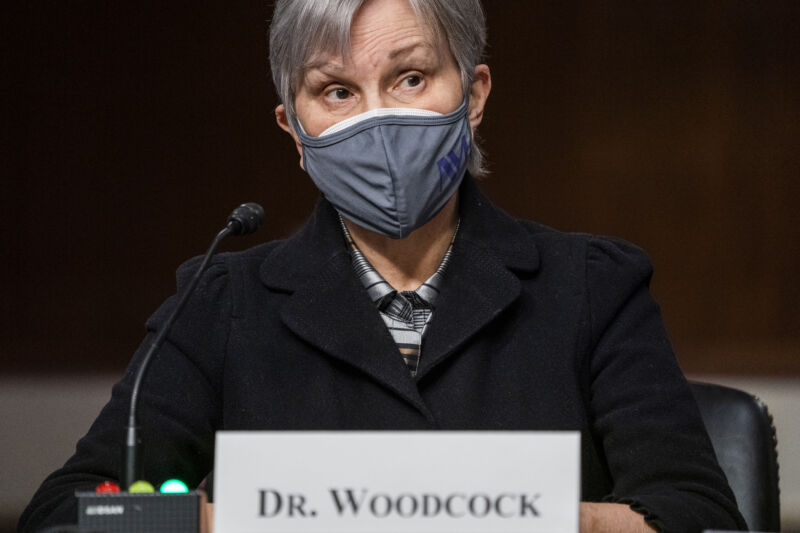
US officials are comparing the ultra-transmissible omicron coronavirus variant to a natural disaster as the country continues to shatter records, logging over 1.4 million new COVID-19 cases Monday and seeing hospitalizations at all-time highs of over 140,000.
Officials are now bracing for the weeks ahead, which are expected to bring yet higher numbers of cases that will hamstring health care systems and other essential services nationwide.
"I think that we're talking about a natural disaster," Janet Woodcock, acting commissioner of the Food Drug Administration, said in a Senate Health Committee hearing Tuesday. "I think right now, we need to focus on continuity of operations for hospitals and other essential services as this variant sweeps through the population."
It has been less than seven weeks since researchers first reported omicron and just 42 days since it was detected in the US. But the highly mutated variant now accounts for an estimated 98 percent of coronavirus infections, according to an analysis updated today by the Centers for Disease Control and Prevention.
The explosive spread has sent cases skyrocketing. The US reported 1,417,493 new COVID-19 cases Monday, according to data tracking by The New York Times. The daily tally breaks the country's previous record of just over 1 million cases on January 3, and it also sets a new global record. The seven-day average of daily new cases is now over 737,000, a 203 percent jump from two weeks ago.
Hospitalizations have seen a relatively smaller spike but are now at the highest levels seen in the pandemic. On Sunday, the US reached its record of just over 142,000 hospitalizations, previously set in mid-January 2021. On Monday, the US reported over 140,000 hospitalizations, bringing the seven-day average to 135,559, an 83 percent increase in the past two weeks. Deaths are also rising. The US reported 1,673 deaths Monday, bringing the seven-day average to 1,653 per day, a 36 percent increase in the past two weeks.
Bracing for disaster
Some eastern states and areas hit by omicron early in its spread, such as New York and the District of Columbia, may be nearing or seeing peaks in cases. But some Midwestern states are still early in their peaks, meaning omicron's surge through the US may not subside for several more weeks.
In the Senate hearing Tuesday, Dr. Woodcock and other health officials defended the federal response to the pandemic, particularly this latest and most devastating wave. Dr. Anthony Fauci, President Joe Biden's chief medical adviser, called the omicron wave a "massive, unprecedented surge."
"This is an extraordinary virus, the likes of which we have not seen even close to in well over 100 years," he said. "We're doing the best we possibly can," he added.
Sen. Mike Braun (R-IN) specifically asked Woodcock if it was time to dramatically change and "decentralize" the country's approach to handling the virus, noting that health precautions and vaccine mandates didn't appear to avert the current omicron wave.
"You can fire a board of directors because your factory was devastated by a hurricane, a tornado, or a wildfire, but I don't know whether that would improve the situation," Woodcock said (at 2:41:51).
"Prior approaches" aren't responsible for the omicron wave, Woodcock added. She then tried to redirect the discussion away from politics, giving a sobering outlook of the next few weeks.
"I think it's hard to process what's actually happening right now, which is [that] most people are gonna get COVID," Woodcock said. "And what we need to do is make sure that the hospitals can still function [and that] transportation [and] other essential services are not disrupted while this happens. I think after that will be a good time to reassess how we're approaching this pandemic."
reader comments
575